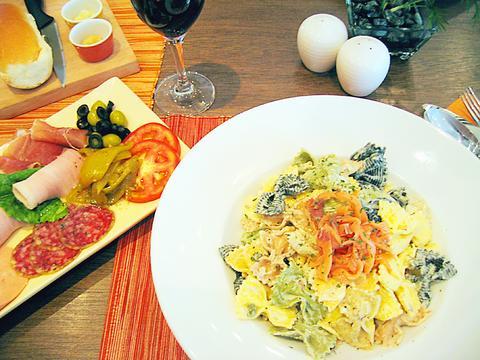For nearly three years, chef and restauranteur Andre Joulian has been cooking up a storm at his hugely popular Tianmu-based French restaurant, Le Jardin. In May this year Joulian decided to branch out and opened Scoozi, an Italian- and Mediterranean-styled eatery.
Located a stone's thrown away from Le Jardin, dining at Scoozi is a real pleasure. The walls are adorned with a selection of agreeable works of art by Robert Egan, tables are far enough apart to allow for privacy, the glass facade guarantees plenty of natural light and the kitchen and waiting staff are always on the ball and provide good service with a smile.
As Scoozi has been designed to be a place for families and groups the portions are large and the dishes can easily be divided into smaller portions to allow diners to savor the fantastic tastes of more than one dish. A party of two can easily make do with one appetizer and two main dishes and still walk away from Scoozi feeling satisfied.

PHOTO: GAVIN PHIPPS, TAIPEI TIMES
The place offers a selection of eight anti-pastas that range in price from NT$230 to NT$330. These anti-pastas include the excellent Scoozi (NT$330), which is a selection of cold cuts served with olives and bell peppers, as well as lumache con pomodoro al forno, or snails with cheese and tomato sauce (NT$230) and caprese (NT$260), for which Joulian uses only genuine buffalo mozzarella.
All the pasta served up at Scoozi is homemade and, with 10 varieties to choose from, patrons are guaranteed to find something to their liking. Two that come recommended are the farfalla al salmone (NT$310), or fresh salmon with capers in a light cream sauce' and the linguini a vongole (NT$320), or clams with garlic and herbs in white wine sauce.
Scoozi's 12-inch pizzas are a must-try. With a thin yet not too crispy crust and topped off with the joint's secret spice, there are eight varieties listed on the menu and range in price from NT$290 to NT$380.
A selection of main courses featuring fish, game and red-meat dishes are also available and will set diners back a wee bit more than the pizza and pasta, but at between NT$330 and NT$570, none of them will break the bank.
The desserts are limited, but a pleasant enough way to round off a meal is to sample the always-popular tiramisu (NT$130) or creamy pinna cotta (NT$120) and bunnet (NT$140).

May 26 to June 1 When the Qing Dynasty first took control over many parts of Taiwan in 1684, it roughly continued the Kingdom of Tungning’s administrative borders (see below), setting up one prefecture and three counties. The actual area of control covered today’s Chiayi, Tainan and Kaohsiung. The administrative center was in Taiwan Prefecture, in today’s Tainan. But as Han settlement expanded and due to rebellions and other international incidents, the administrative units became more complex. By the time Taiwan became a province of the Qing in 1887, there were three prefectures, eleven counties, three subprefectures and one directly-administered prefecture, with

President William Lai (賴清德) yesterday delivered an address marking the first anniversary of his presidency. In the speech, Lai affirmed Taiwan’s global role in technology, trade and security. He announced economic and national security initiatives, and emphasized democratic values and cross-party cooperation. The following is the full text of his speech: Yesterday, outside of Beida Elementary School in New Taipei City’s Sanxia District (三峽), there was a major traffic accident that, sadly, claimed several lives and resulted in multiple injuries. The Executive Yuan immediately formed a task force, and last night I personally visited the victims in hospital. Central government agencies and the

Among Thailand’s Chinese Nationalist Party (KMT) villages, a certain rivalry exists between Arunothai, the largest of these villages, and Mae Salong, which is currently the most prosperous. Historically, the rivalry stems from a split in KMT military factions in the early 1960s, which divided command and opium territories after Chiang Kai-shek (蔣介石) cut off open support in 1961 due to international pressure (see part two, “The KMT opium lords of the Golden Triangle,” on May 20). But today this rivalry manifests as a different kind of split, with Arunothai leading a pro-China faction and Mae Salong staunchly aligned to Taiwan.

As with most of northern Thailand’s Chinese Nationalist Party (KMT) settlements, the village of Arunothai was only given a Thai name once the Thai government began in the 1970s to assert control over the border region and initiate a decades-long process of political integration. The village’s original name, bestowed by its Yunnanese founders when they first settled the valley in the late 1960s, was a Chinese name, Dagudi (大谷地), which literally translates as “a place for threshing rice.” At that time, these village founders did not know how permanent their settlement would be. Most of Arunothai’s first generation were soldiers